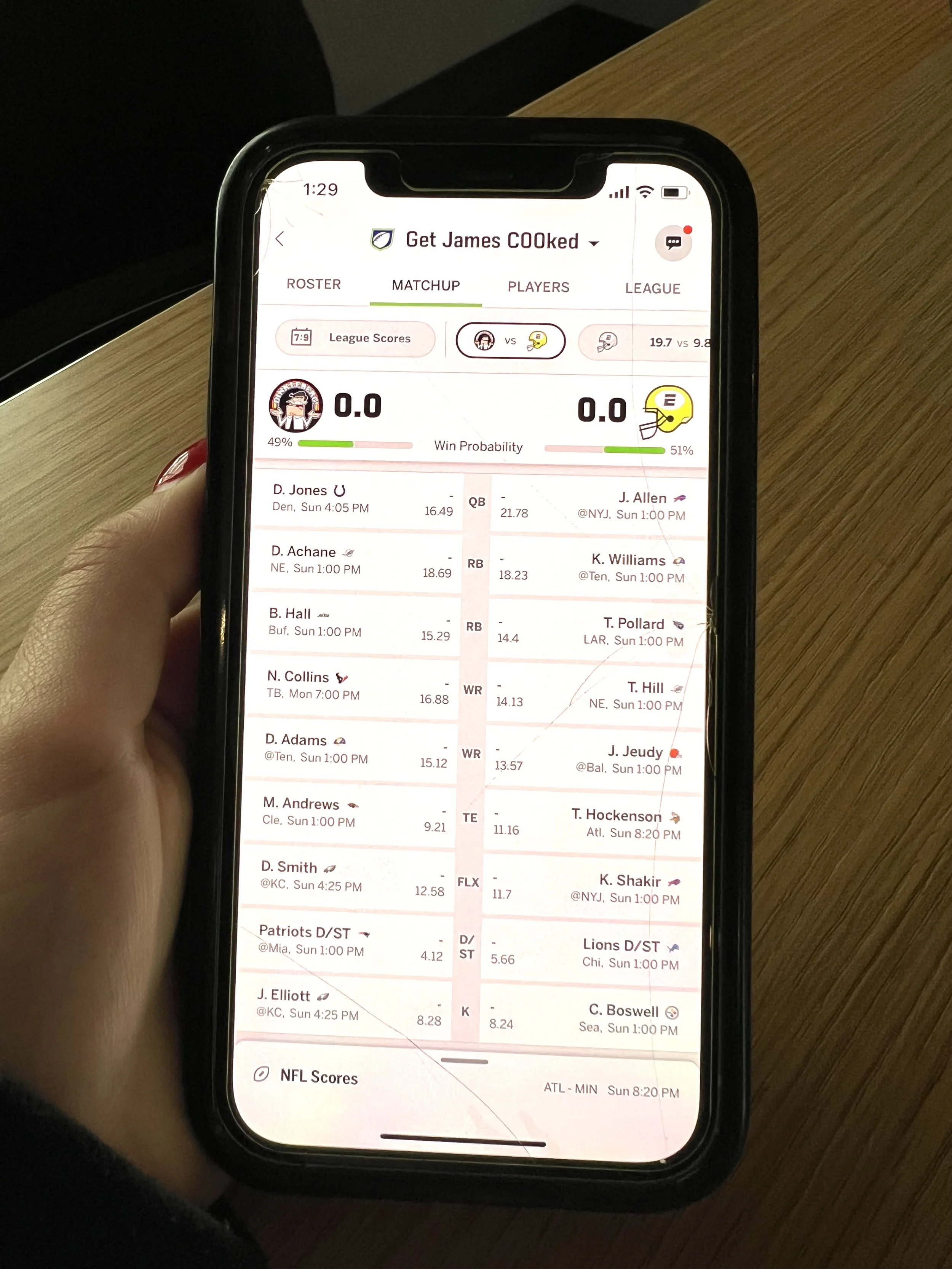Luck or Logic: Two Roads to Fantasy Football Glory
Fantasy Football matching you head to head. Photo by Lindsey Clinton '27.
You know it’s that time of year again when the air is crisp, the evenings are loud and the room above you in McCormick shakes with cheers, groans and the occasional curse. Football season is back, baby.
The thrill of every kickoff, every touchdown, every gut-punch of a last-minute turnover fills the week with tension and excitement. And with football comes fantasy football, the game that turns casual fans into analysts, makes every matchup matter and turns a simple Sunday into a full-blown obsession.
One point can decide victory, one injury can ruin a lineup and one smart (or just lucky) pick can make a season. In the middle of all this, every player faces the same dilemma: do you come into your draft armed with research, stats and strategy, or do you dive in on instinct and luck, letting chaos decide your fate?
Bella Obligado, ‘26, stepping into her second year of fantasy football, took a bold, wing-it approach to her draft.
“I didn’t have much of a plan going into the draft, which I do regret,” she admitted, a mix of amusement and hindsight in her voice.
Rather than poring over matchups or obsessing over positional rankings, Obligado kept it simple: snag strong running backs early, and if the top options were gone, pivot to flashy quarterbacks like Lamar Jackson or Josh Allen who could carry her team.
After the sixth round, she was reaching for names she barely recognized, hoping a gamble here or there might pay off. It was a strategy built on instinct, intuition and just rolling the dice, sometimes brilliant, sometimes messy.
Her approach shows one of fantasy football’s most intoxicating qualities: unpredictability. Even with minimal prep, the draft can surprise you. A mid-round pick could become the season’s breakout star, and a well-known quarterback might fumble at the worst possible moment. Obligado’s willingness to dive in without a rigid plan is part of what makes fantasy football so compelling. Not every league needs a spreadsheet to be fun, and sometimes the chaos is half the thrill.
But there’s more to the game than stats and scores. For Obligado, fantasy football serves as a way to connect over a beloved, all-American sport. She’s eager to watch her roster come to life, to trash-talk with friends and to revel in the excitement of wagers. Her strategy may not be perfect or destined to win her league’s $80 pot, but it’s undeniably fun.
Others take drafting a little more seriously.
Chase Auch, ‘28, a veteran at fantasy with five seasons under his belt, is now participating in three leagues this year, two of which have cash prizes. For him, preparation is central to success.
“A lot of the preparation for drafting comes from knowing certain players’ situations and knowing how much each position depreciates in value each round,” he said. “A running back in the fifth round might not be much better than a running back in the seventh round. Sometimes it’s better to wait on certain positions.”
Auch’s methodical approach requires a deep understanding of the game. You need to know when it’s advantageous to wait on a particular position, recognizing that running backs typically hold more value early due to limited opportunities across teams and balancing risk with consistent performance.
Coming into a draft prepared makes following football slightly less painful for those who are fans of typically weaker teams. Auch’s favorite team, the New York Giants, hasn’t given fans much to cheer about in recent years. Fantasy football, however, gives him a reason to watch and care about games beyond his team.
But preparation isn’t always what determines the outcomes.
“In my first season of fantasy, I went in knowing nothing and having no plan, but still managed to place third,” Auch admitted. “There is definitely a luck component, and you can still do very well without a plan.”
Ultimately, the debate between preparation and spontaneity comes down to what each player values most. For Obligado, the social experience, the unpredictability and the fun of engaging with friends outweigh meticulous planning. For Auch, the strategic edge, the enhanced enjoyment of football and the thrill of outsmarting other players define his approach.
Both paths have merit, and the best strategy might be a blend: go in with some preparation to secure key positions and understand league rules, but leave room for flexibility and intuition, embracing the luck and surprises that make fantasy football such a compelling experience.
